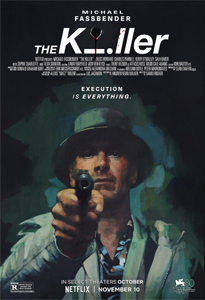“The Killer” (Netflix) takes the structure of a “John Wick” film but replaces the action with tension. In both cases, the plot is unimportant. The films trust that viewers know the broad strokes of the underworld of assassins, and the closed-loop narrative wherein contract killers and their handlers scheme to preserve their business interests – or simply their lives.
Based on a 1998 French comic book by writer Matz and artist Luc Jacamon, the film is a litmus test for a viewer’s taste. I found that I like stylized non-stop action much more than stylized slow-burn tension, at least when the stakes are purposely generic and beside the point.
Director David Fincher and writer Andrew Kevin Walker previously teamed on “Seven” (1995), fairly ranked as the 19th-best film of all time by IMDb users. Their catalogs promise grim style (Walker also penned 1999’s “8MM”), but also narrative intrigue, sharp personalities and dark peeks into humanity.
“The Killer” (2023)
Director: David Fincher
Writer: Andrew Kevin Walker, based on the comic book by Matz (writer) and artist Luc Jacamon (artist)
Stars: Michael Fassbender, Charles Parnell, Tilda Swinton
“The Killer” very much keeps the style, as cinematographer Erik Messerschmidt takes us to Paris, the Dominican Republic, New Orleans, Miami and New York in the footsteps of the titular Killer played by Michael Fassbender. But it has no plot complexities at all as the Killer travels the globe cleaning up loose ends after a botched job puts him at risk.
The logistics of assassinations
Instead, it’s a deep-dive logistical piece about the life of an assassin. Like Jason Bourne, The Killer is well-equipped with cash, weapons and fake IDs. He knows the procedures, and – because of the steady voiceover narration – we know he knows. That doesn’t mean it will be easy, but The Killer is as prepared as he can be in a world of mass surveillance.
And arguably it’s a psychological piece. But we know from the opening sequence in his Paris sniper’s nest – wherein he tells us of the necessity for an assassin to be OK with boredom – that The Killer is a sociopath. He sees people as numbers; 4.7 people die every second, 4.2 are born every second. He tells us he’s not going to make a dent with his clinical and relatively rare murders. It never occurs to him that an individual has intangible value.
Whether it’s impressive or disappointing that we never like the Killer – despite him being a first-person narrator – again comes down to taste. Sociopathy can be simple or complex, depending on how you present it. Either the Killer is going to stick to his pure sociopathy and get the job done, or he’s going to reveal a smidgen of humanity, and that will be his undoing. “The Killer” leans so much into logistics, though, that roteness comes dangerously close to replacing intrigue.

I started off with the “John Wick” comparison thinking I’d point out that obviously “The Killer” is a better character study. However, I changed my mind: The decisions of Wick, and our hints as to whether he’s good or bad or somewhere in-between (and what that means for him and for us), are much more interesting than those of The Killer.
His brain functions in machine-like fashion. He repeats a mantra about narrow focus and avoidance of empathy like it’s his base operational code; his love of The Smiths doesn’t humanize him. He could be The Terminator.
Showcased showdowns
Similarly, I was going to note that Fassbender is naturally a better actor than Keanu Reeves, but I’m reflecting on that assumption, too. When going so minimalist, when asking the viewer to mull one assassin’s movements for 2 hours, acting range isn’t so important.
It’s a testament to how naturally good Fassbender is – along with supporting players like Charles Parnell (as The Lawyer), Tilda Swinton (as The Expert, a fellow assassin, on the other side of this conflict) and Arliss Howard (as The Client) – that “The Killer” is as at all compelling, rather than being utterly dreary. Each of them have a showcase showdown scene with The Killer, and my attention perked up for each.
“The Killer” certainly achieves its one and only goal (detailing a personality/professional type that we’ll never encounter in real life). A cast and crew at this level isn’t going to miss that easy target.
But Fincher’s and Walker’s catalogs loom over “The Killer.” It would be an impressive calling card of style for green filmmakers uncomfortable with storytelling, but this deep into their careers, it’s more of an indulgence. It’s not a waste of time when the global locales look so nice, but I gotta think the film would’ve been better if it wasn’t only an assassin’s portrait.

